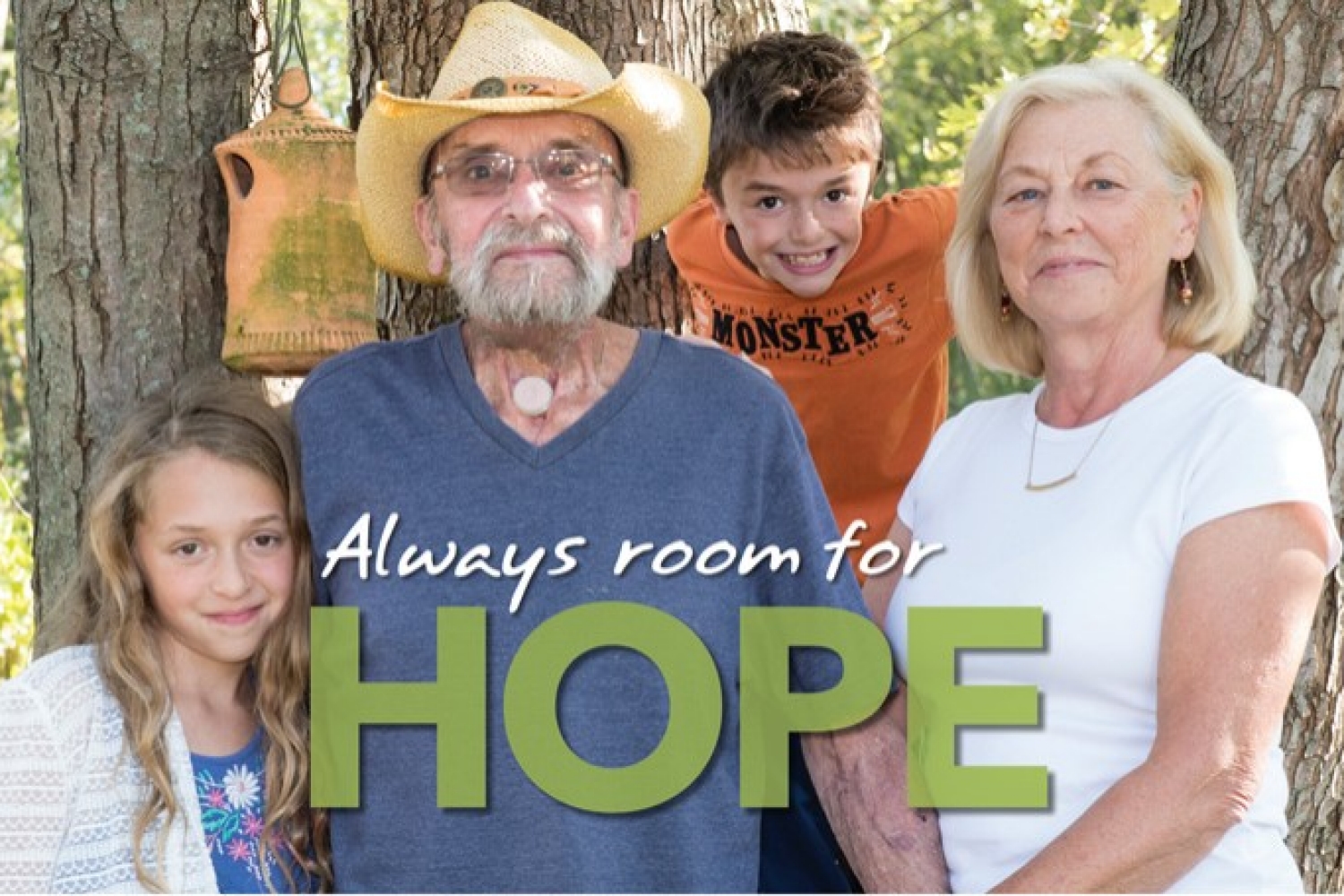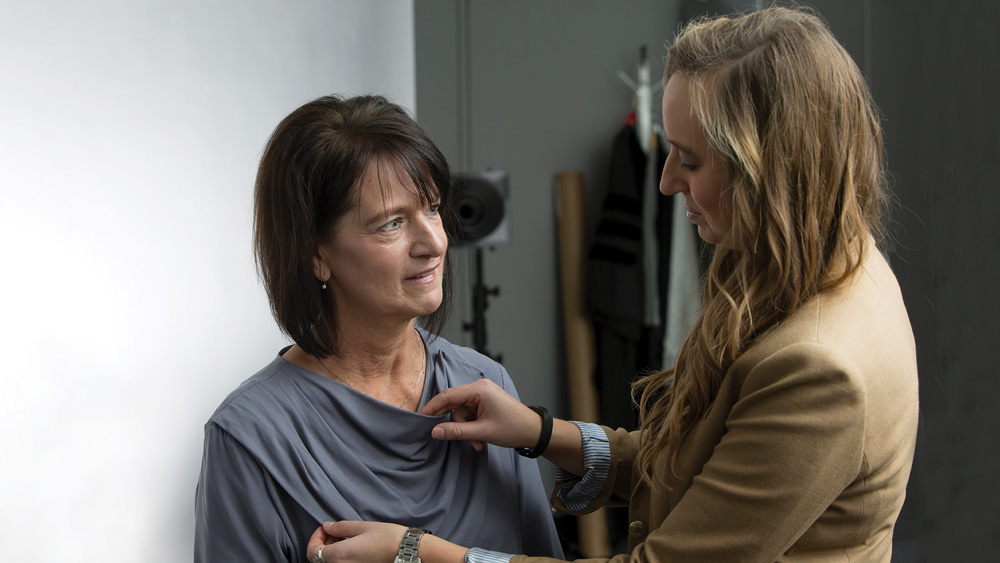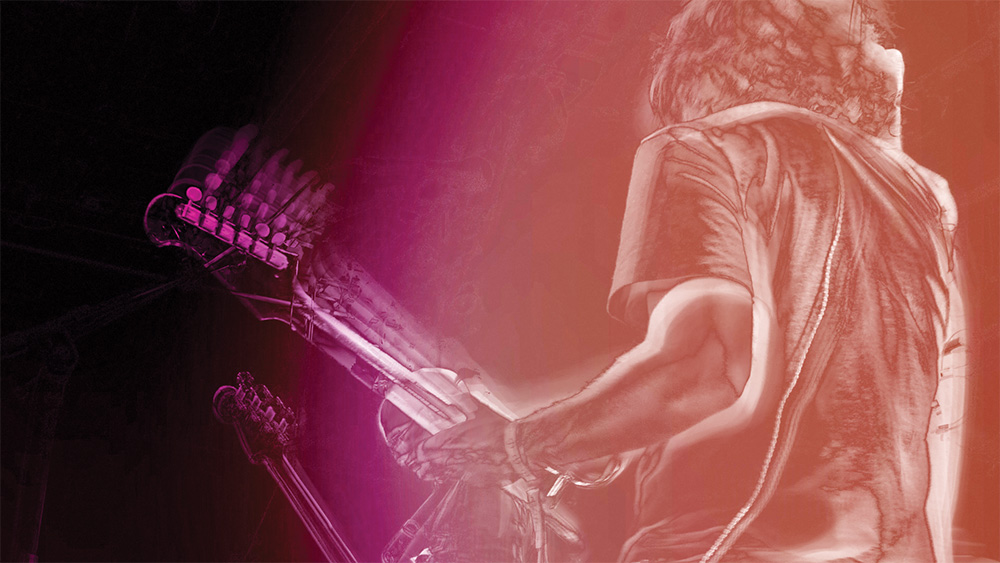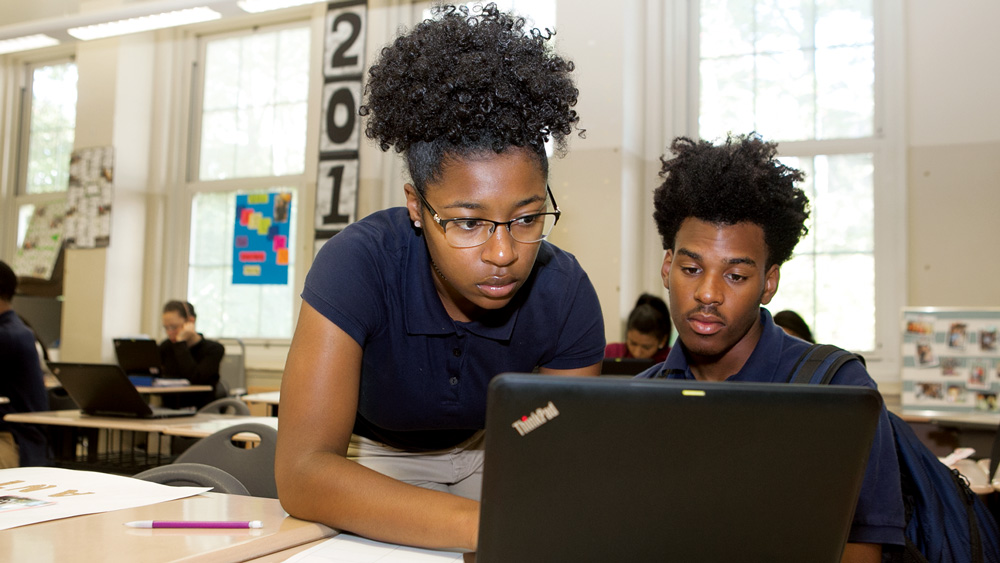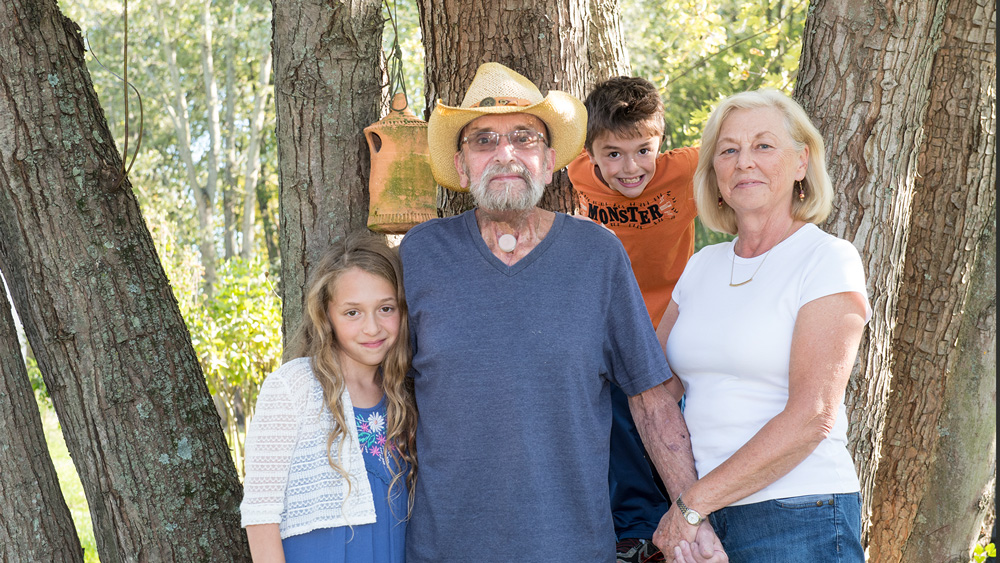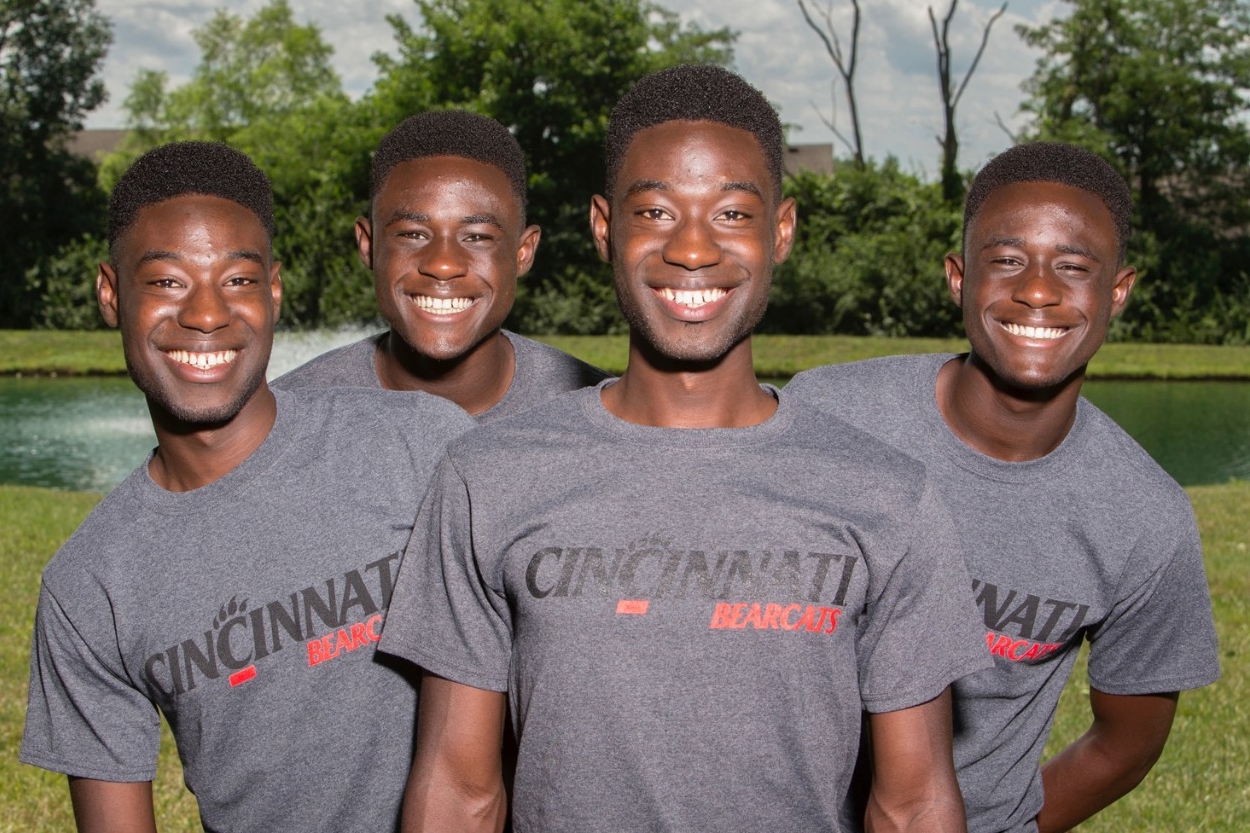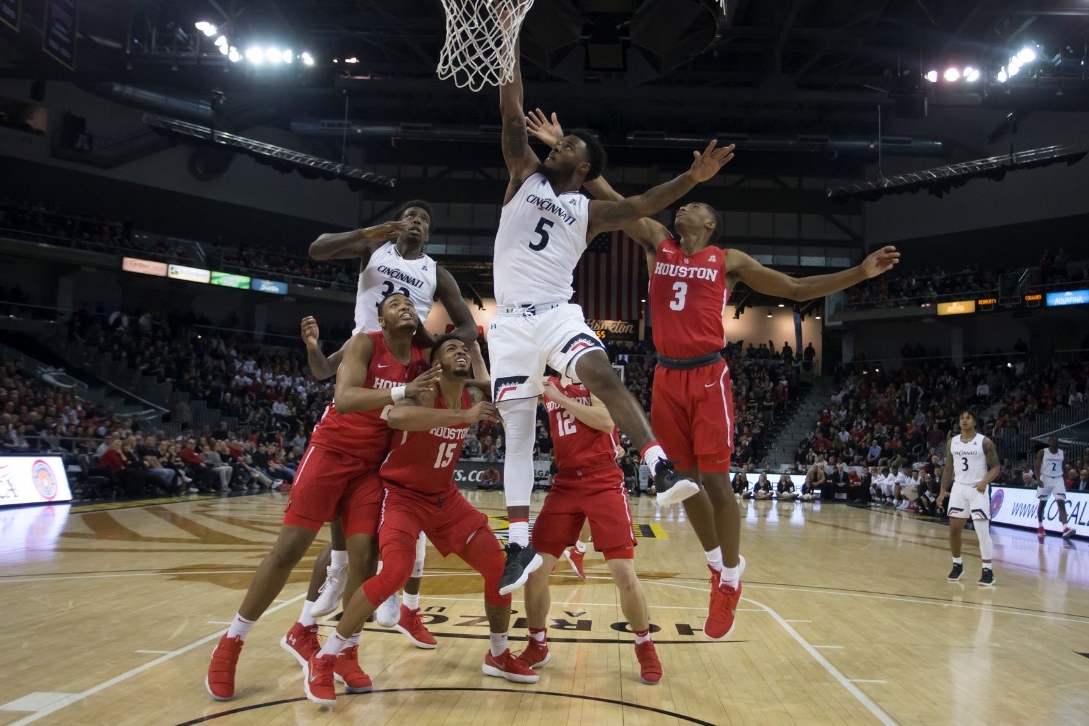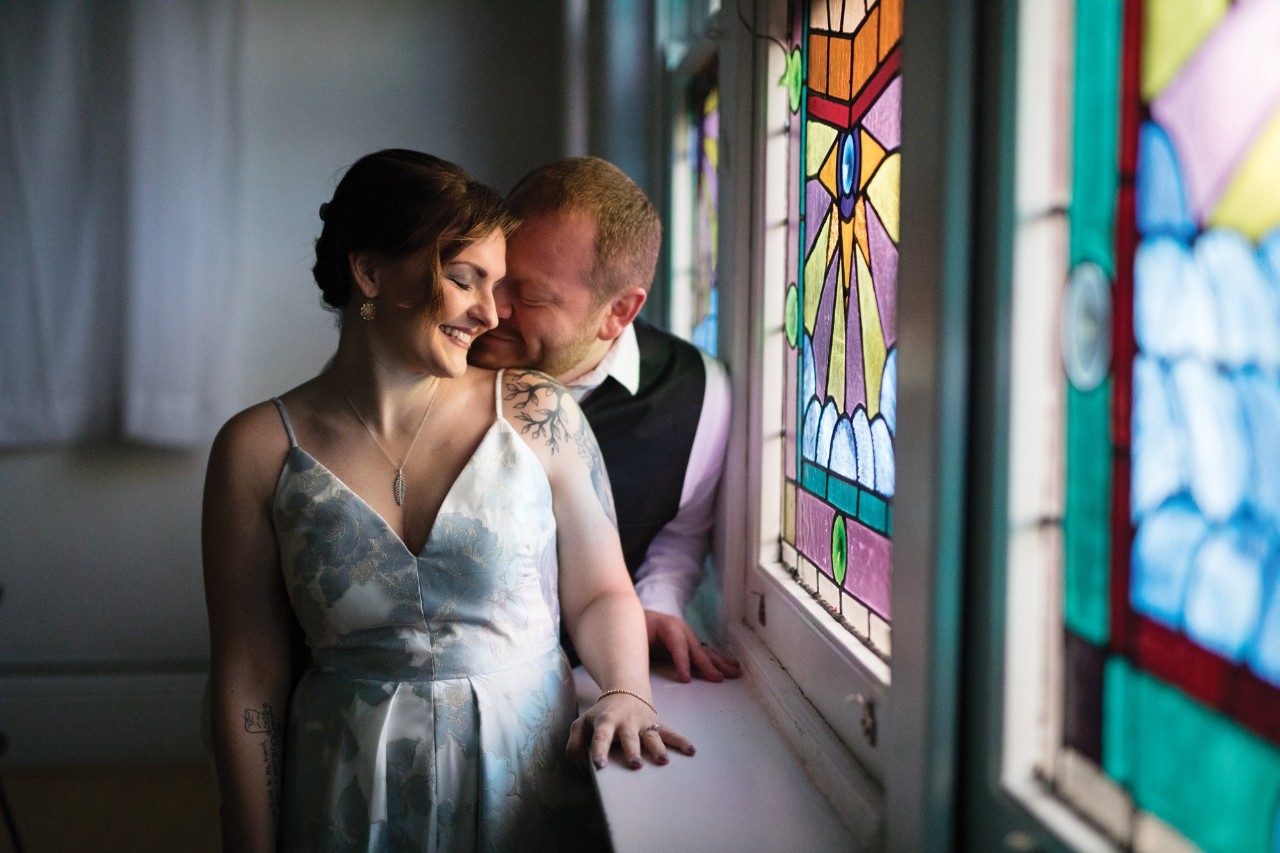Daryl “Poncho” Noggler and his wife, Peggy, with their grandchildren Azeeza, 9, and Joseph, 10. Poncho, who suffered an agressive head and neck cancer, was told in 2016 that he should get his affairs in order. He gained nearly two more years with his family thanks to immunotherapy treatment at the University of Cincinnati. He died on March 4, 2018, after this article was completed.
Man gains precious time with family thanks to innovative UC cancer treatment
D
aryl “Poncho” Noggler was out of options.
Doctors had informed him that treatment wasn’t working, and the invasive head and neck cancer he’d been fighting would, indeed, take his life. A far-too-common end, but for this type of cancer, doctors have grown accustomed to breaking the tragic news to their patients that they should get their affairs in order.
For Poncho, 68, that would mean entering hospice and saying goodbye to Joseph and Azeeza, the 9- and 10-year-old grandchildren he and his wife, Peggy, have raised.
Then everything changed.
Only 24 hours after delivering the devastating news to Poncho that he was dying, Dr. Trisha Wise-Draper, a UC Health oncologist and assistant professor at the UC College of Medicine, noticed something — a change in his skin. Poncho had developed what looked like little warts on his throat, near his tracheostomy stoma, an opening made into the trachea as a result of his cancer. But that day, Wise-Draper noted they were actually disappearing, so she sent him for a follow-up scan and a scope of his airway.
Nearly 24 hours later, when the results came back, Peggy remembers the reaction vividly.
“Dr. Patil [Poncho’s otolaryngologist] threw his hands up and backed up against the wall. He exclaimed, ‘It’s gone!’” she recounts. Poncho had what Wise-Draper calls a “late response” to the treatment.
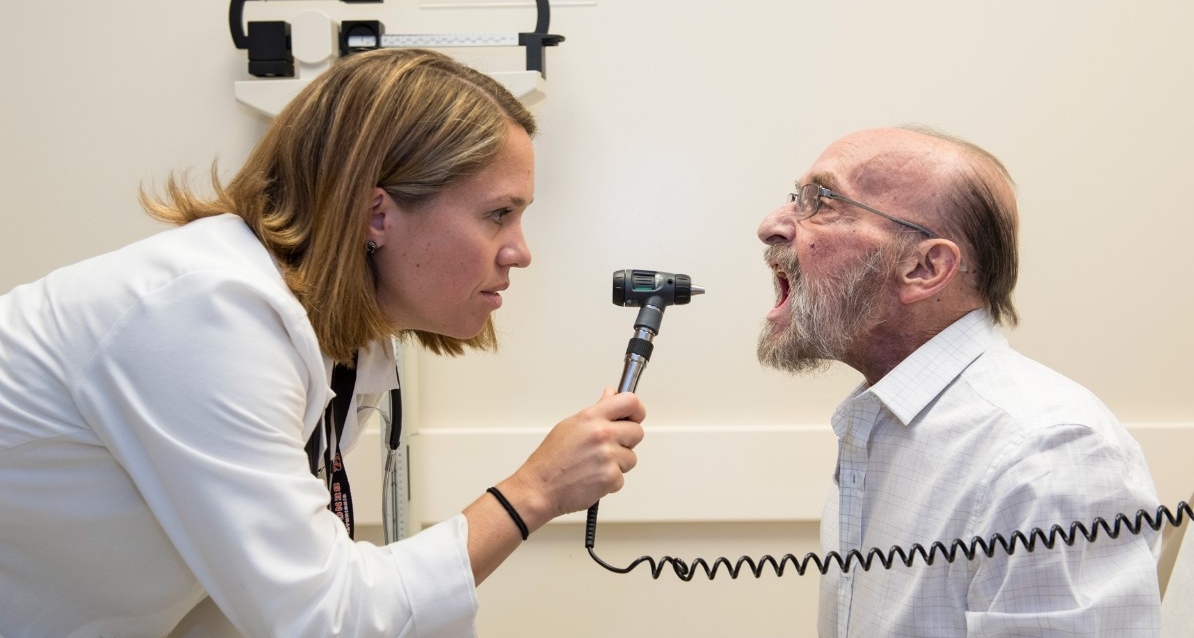
She is what some call a triple threat — not only does she treat patients as an oncologist, but Dr. Trisha Wise-Draper (left) also teaches future physicians and studies the underlying mechanisms of cancer that could lead to newer and better treatments.
“It was an emotional roller coaster ride,” said Poncho. “You go from having months to live to being cancer-free. You’re scared to be hopeful.”
Poncho’s incredible story of survival was thanks to immunotherapy, the latest promise in cancer treatment. For nearly two years, he remained very much alive and active — often working in his barn, walking his 9-acre property in Hamilton Township, northeast of Cincinnati, with Peggy or spending time go-karting or throwing tomahawks with the grandkids.
“We are very cautious in saying it, but immunotherapy — using the patient’s own immune system to fight cancer — could be the cure for a certain subset of patients, like Poncho,” says Wise-Draper, a UC alumna, PhD ’08, MD ’10. “There has never been this type of option in head and neck cancers before, and we always went in telling patients they would not survive. Now, we need to focus on bringing immunotherapy to the front line, and that is the focus of much of the research.”
Facing another hurdle
Poncho and Peggy Noggler — married for 46 years after meeting on a blind date and experiencing love at first sight — said they are true examples of how tough situations can be overcome with positive thinking and a great support network.
Side by side, they cared for a daughter with mental illness while raising their two grandchildren, one with special medical needs. They did it together and came out triumphant, both touting the other as the true hero. Poncho was a retired electrician who worked for the International Brotherhood of Electrical Workers (IBEW) 212 for 10 years and for the City of Blue Ash in facility maintenance for 25 years. There’s even an official Poncho Noggler Day observed in Blue Ash each December because of his service to the city. To say he was revered is an understatement.
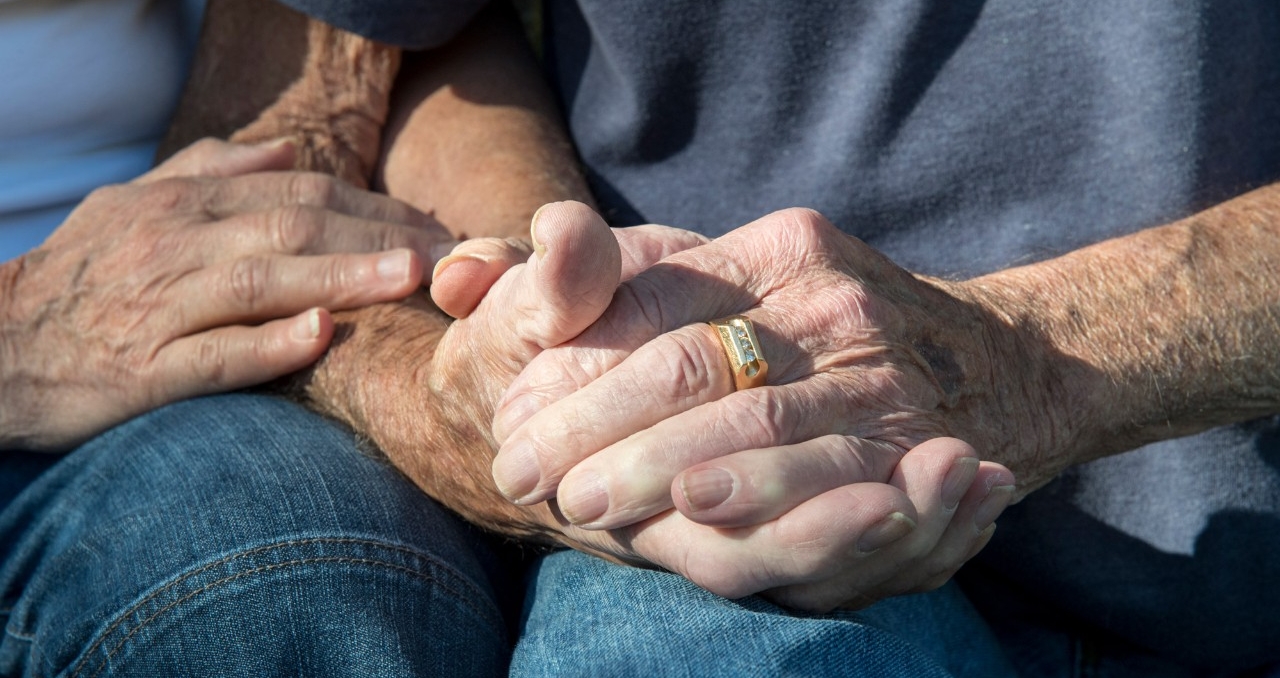
The Noggler’s hurdle with cancer began in July 2014, after returning from vacation.
“Poncho had been experiencing voice problems for over 10 years,” says Peggy, adding that he’d seen their primary care physician, an ear, nose and throat (ENT) specialist as well as an allergist, and still they hadn’t received a diagnosis. Another trip to the ENT and a scope showed that there was a mass; a biopsy confirmed that it was cancer.
Poncho underwent daily chemotherapy and radiation treatments for six weeks, which seemed to be successful, but when treatment stopped, the cancer returned. In February 2015, the ENT recommended they see his mentor at UC Health — Dr. Yash Patil, associate professor of otolaryngology at the UC College of Medicine, a head and neck cancer specialist at UC Health and member of the UC Cancer Institute.
Patil suggested a complete laryngectomy — removal of the larynx and separation of the airway from the mouth, nose and esophagus.
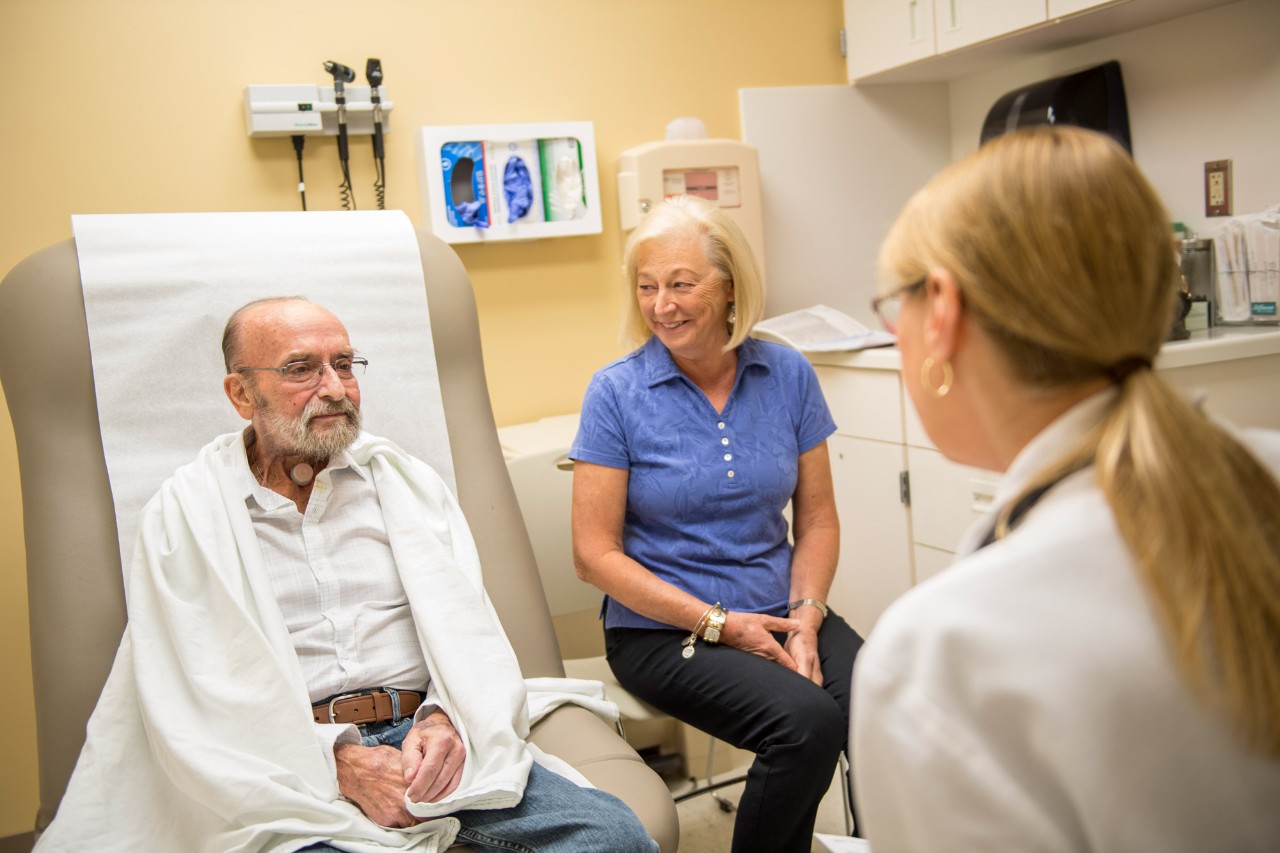
Poncho and Peggy Noggler were teammates in life and love, each calling the other a “hero.” Peggy accompanied Poncho to all of his medical visits, serving as his advocate.
“It was one of the hardest things I’ve ever experienced,” said Poncho, who endured skin grafts and lymphedema as a result of the procedure. He remained able to speak, but it was much more difficult, as his voice had turned into a whisper, and he experienced complications with occasional blockages to his trach tube. Peggy says he was never been one to complain. The laryngectomy made it even more difficult with so many aspects of living.
The invasive treatment was only a temporary fix, and a year later, in December 2015, follow-up scans showed that the cancer had returned and spread to his lungs.
“I just didn’t even want to think about dealing with it [when I heard the cancer was back],” he said.
“Poncho is such a caring person. He told me he was more concerned for me and the kids than he was about himself,” Peggy adds.
This is when the Nogglers met Wise-Draper.
The promise of immunotherapy
She is what some call a triple threat — not only does she treat patients as an oncologist, but Wise-Draper also teaches future physicians and studies the underlying mechanisms of cancer that could lead to newer and better treatments.
Her team focuses on therapeutic resistance and biomarkers in head and neck cancer. Specifically, she is interested in identifying mechanisms important for immunotherapy resistance, including T-cell (a main player in the immune system) dysfunction as well as their components and key signaling pathways. Wise-Draper is also a leader within the Experimental Phase I Therapeutics Program — the first step in bringing clinical trials to patients and the only program of its kind locally.
Wise-Draper, a member of both the Cincinnati Cancer Center and UC Cancer Institute, was also a principal investigator on clinical trials studying pembrolizumab, a type of immunotherapy which is now approved by the FDA. It blocks a protective mechanism on cancer cells and allows the immune system to destroy those cancer cells.
“Immunotherapy has revolutionized the field of cancer, particularly in the area of head and neck cancer, which overall has poor outcomes for patients. We’re seeing improvements in patient’s survival rates from metastatic cancer — from 10 months to 3 years,” she says, adding that immunotherapy also has fewer side effects, giving patients a better quality of life.
“The question we’re hoping to answer now is why does this work so well for some patients and not others?” says Wise-Draper. “We are trying to figure out how we can increase cure rates and improve the success of these therapies for patients with head and neck cancer. Research is focusing on new combinations of drugs and new immuno targets. We need to figure out how to deliver the drugs and then activate them in the correct area at the correct time.”
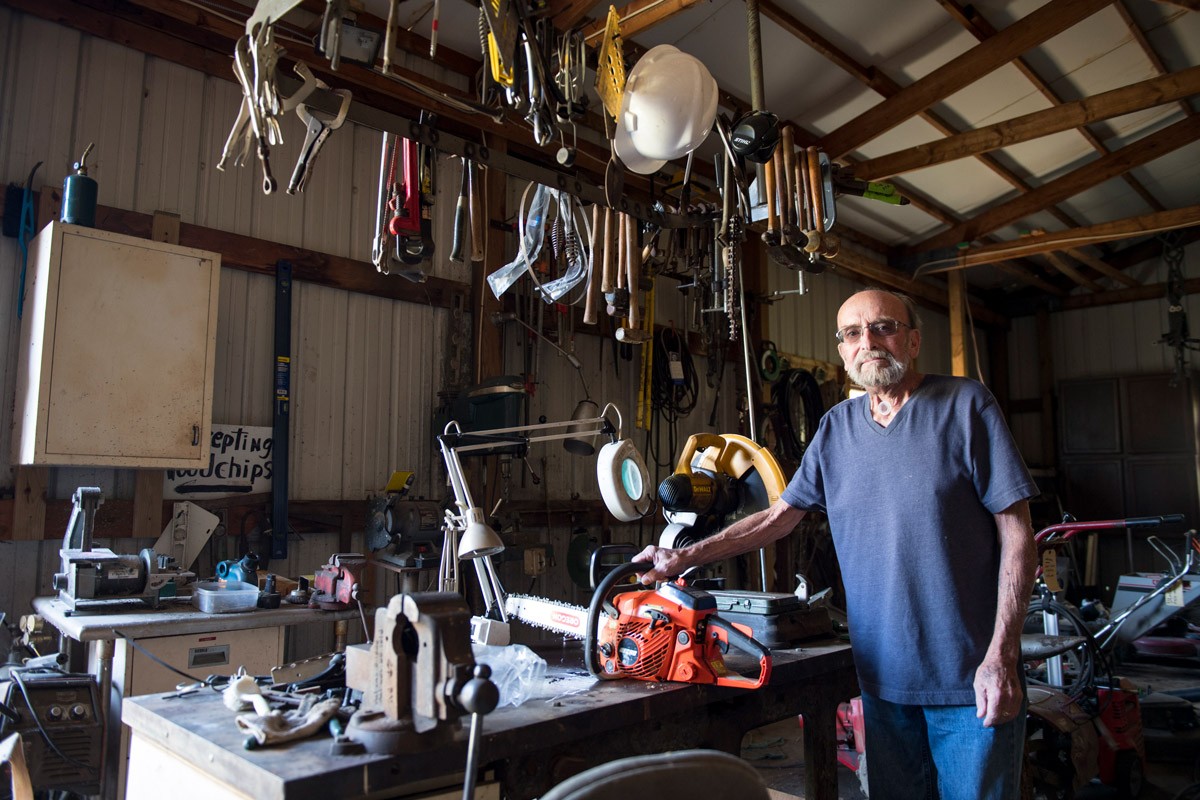
Poncho Noggler, a retired electrician, remained active by working in his barn and on his 9-acre property after overcoming aggressive head and neck cancer.
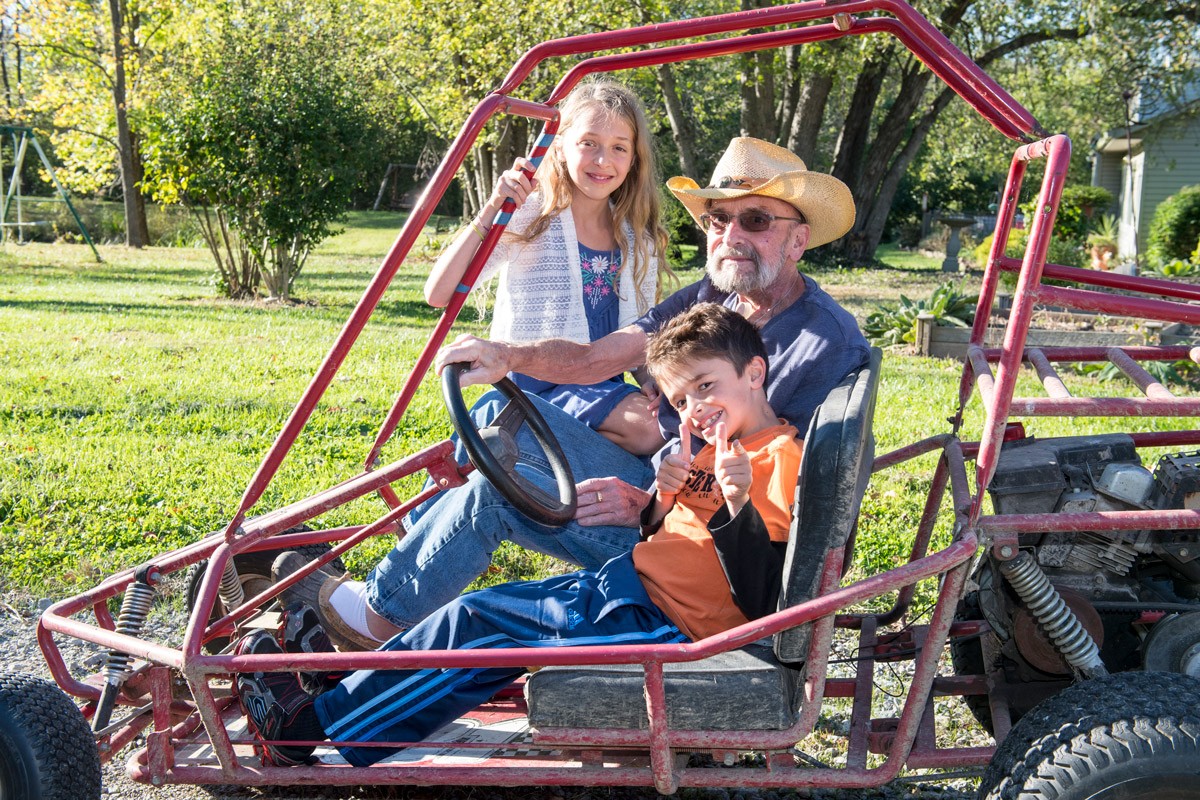
Because of immunotherapy, Poncho gained more time to do the things he loved most, like playing with grandchildren Azeeza and Joseph.
A miraculous recovery
After seeing Poncho, Wise-Draper put him back on chemotherapy and then enrolled him in a clinical trial, where patients were randomized to receive either pembrolizumab, being studied at the time, or standard care (radiation and chemotherapy).
Poncho was randomized to receive standard care, but he did not respond to treatment. As a last-ditch effort, Wise-Draper put him on another immunotherapy drug that works in the same way as pembrolizumab, but she was not seeing results.
“I tried to enroll him in another clinical trial, but he didn’t qualify, and he was returning for an appointment in the summer of 2016,” says Wise-Draper. “I was ready to refer him to hospice with months to live because he wasn’t responding to treatment. Our options were running out. This was after five weeks of being on [the immunotherapy].”
After seeing his miraculous comeback, Wise-Draper switched his treatment to pembrolizumab, which had just been given the green light by the FDA, and he continued to show no signs of cancer. He was finally taken off the therapy in fall 2017.
Poncho resumed his happy life with his loved ones, remained active and appreciated all he had.
“You can’t ever let the cynicism take over,” he said. “There’s always room for hope.”
UPDATE: Poncho Noggler passed away on March 4, 2018. His wife Peggy says that he still “beat cancer” and is a true success story — an example of the great things that UC is doing for patients who are battling the toughest of illnesses. The immunotherapy allowed him to have two more years with his loving family, and for that, she says she is grateful.
Accelerating
UC's Cancer Research
UC officials point out that scientists need funds to continue the important research and discovery that ultimately extended Poncho Noggler’s life.
Gifts from committed donors in the community will help in those efforts by assisting in the recruitment and hiring of researchers dedicated to expanding and accelerating the work in cancer research.
National Cancer Institute-designation is the highest recognition for an academic cancer center, a designation that opens doors to new research funding, along with bringing the most advanced cancer care to patients. UC plans to pursue this designation in the next several years.
In the past year, three community donors have committed $10 million each to discovery, innovation and exploring new targeted treatments in cancer research.
Katie Pence is the assistant director of public relations at UC's Academic Health Center and contributes to UC Magazine.
Additional Credits: Thanks to photographer Colleen Kelley, designer Kathy Warden as well as web developers Kerry Overstake and Carolyn Noe for helping to develop and present the content contained in this piece.
FEATURES
Inspired by her mother, DAAP alumna launches clothing line for women recovering from breast surgery.
The 1991 implosion of UC’s Sander Hall continues to reverberate with the upcoming release of a powerful new book about the building’s architect from the perspective of his daughter.
Matt Berninger and Scott Devendorf of alt-rock band The National reflect on their formative years at UC.
UC’s new high school ambassador program could serve as a national model for helping low-income and first-generation students attend college.
How a local man gained precious time with his family thanks to innovative UC cancer treatment.
Leading urban public universities into a new era of innovation and impact.

